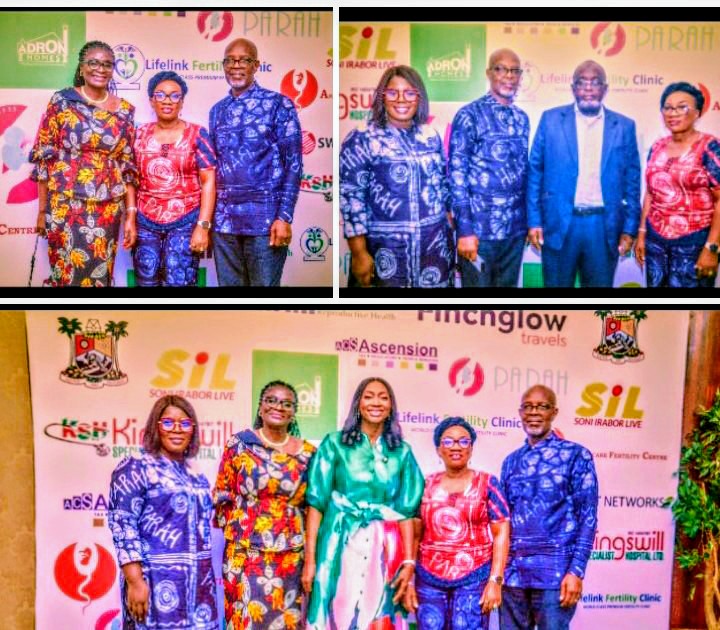
Gynaecologists and medical experts have identified several factors contributing to the rising infertility rates among Nigerians. They cite lifestyle changes, environmental pollution, and delayed childbearing as key contributors. Additionally, increasing stress levels and exposure to harmful chemicals are exacerbating the issue Experts emphasize the need for comprehensive public health strategies to address these challenges and improve reproductive health outcomes.
At the 2024 Fertility Conference in Lagos on Saturday, experts unveiled groundbreaking insights.
The Parah Family Foundation (PFF) hosted its annual event with the compelling theme, “Infertility – Need for Knowledge and Early Intervention.” This gathering aimed to raise awareness and promote early intervention strategies for those facing infertility, emphasizing the importance of education and proactive measures.
Prof. Preye Fiebai, an esteemed specialist in Obstetrics and Gynaecology at the University of Port Harcourt, addressed a significant issue at a recent conference. He pinpointed ignorance and lack of awareness as key drivers behind the escalating infertility rates in Nigeria. Prof. Fiebai emphasized a crucial misconception held by many Nigerian men: the ability to ejaculate does not necessarily mean they are fertile. This widespread misunderstanding, he argued, underscores the urgent need for better education and awareness about reproductive health.
Professor Fiebai’s research sheds light on a common misconception regarding infertility in Nigeria. Contrary to the widespread belief that women are primarily responsible, his findings reveal a more complex picture. While 20-45% of women in Nigeria face infertility, the underlying causes in marriages are often varied.
The study details that 40% of infertility cases are due to male factors, another 40% are due to female factors, and 15% stem from issues in both partners. Intriguingly, 5% of cases remain unexplained, suggesting areas for further research and understanding. This comprehensive analysis challenges the prevailing narrative and underscores the need for a balanced approach to addressing infertility.
Professor Fiebai highlighted various causes of infertility, differentiating between factors affecting men and women. For men, he cited erectile dysfunction, impotence, decreased libido, psychological issues, hormonal disorders, aging, and obesity. In women, infertility can stem from cervical and uterine abnormalities, fallopian tube diseases, and ovulation problems.
Similarly, Professor Kehinde Habeeb Tijani, a distinguished surgeon from the University of Lagos, identified several critical factors contributing to infertility. He highlighted that age, weight, and stress play significant roles, alongside lifestyle choices such as excessive alcohol consumption. Moreover, he pointed out the detrimental effects of radiation exposure and frequent exposure of the testicles to high temperatures.
Dr. Kemi Ailoje, MD, and Rev. Tony Akinyemi, joined by other notable speakers, came together to address infertility, offering a range of solutions. They collectively advised against women over 54 seeking pregnancy, emphasizing the considerable risks involved.
During her opening remarks, Princess Dayo Odukoya, the conference convener, expressed deep concern over the “alarming” infertility rates and their underlying causes. She stressed the importance of sustained awareness efforts, urging couples facing infertility to seek early interventions in their marriages rather than postponing action.
“The foundation’s primary objective is to share vital information, enlighten and provide the relevant support system for families undergoing fertility challenges in order to eradicate ignorance, the misguided myths and social stigma associated with delayed fertility in our society.
“The choice of the theme for this year conference; Infertility- Needs for Knowledge and early intervention; is to further reiterate the importance of continued awareness, and knowledge about the challenges of infertility and more importantly, action to be taken as early as possible if not, it may cause further delays especially in late marriage and aged women.
“The journey to Parenthood is lonely and must not be threaded alone. There is need for a support system on this journey and that is where Parah Family comes in.
” The rate of infertility and the causes are alarming such that it requires a continued education that would enable couples undergoing the challenges to speak out on time and seek solution early in marriage rather than wait until later.”, she said
At the conference’s grand finale, the PFF made a heartwarming announcement, gifting two complimentary IVF treatments and a free fertility investigation to three lucky couples. This gesture symbolized hope and new beginnings, transforming the event into a celebration of potential new life.









